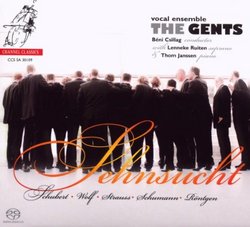| All Artists: The Gents, Lenneke Ruiten, Thoms Janssen Title: Sehnsucht Members Wishing: 0 Total Copies: 0 Label: Channel Classics Release Date: 1/12/2010 Album Type: Hybrid SACD - DSD, Import Genre: Classical Styles: Opera & Classical Vocal, Historical Periods, Classical (c.1770-1830) Number of Discs: 1 SwapaCD Credits: 1 UPC: 723385301097 |
Search - The Gents, Lenneke Ruiten, Thoms Janssen :: Sehnsucht
 | The Gents, Lenneke Ruiten, Thoms Janssen Sehnsucht Genre: Classical
The nineteenth century was a golden age for choral singing in Germany and Austria. Singing clubs, and later on, choral societies, shot up all over this part of the world. With its goal of stimulation and promotion of Germa... more » |
Larger Image |
CD Details
Synopsis
Product Description
The nineteenth century was a golden age for choral singing in Germany and Austria. Singing clubs, and later on, choral societies, shot up all over this part of the world. With its goal of stimulation and promotion of German poetry and music, this movement produced a wealth of wonderful vocal music. On Sensucht, The Gents offer a broad selection of music from this unique musical repertoire. The album also celebrates the 10th anniversary of the group and is their first recording with new conductor Beni Csillag.

 Track Listings (22) - Disc #1
Track Listings (22) - Disc #1